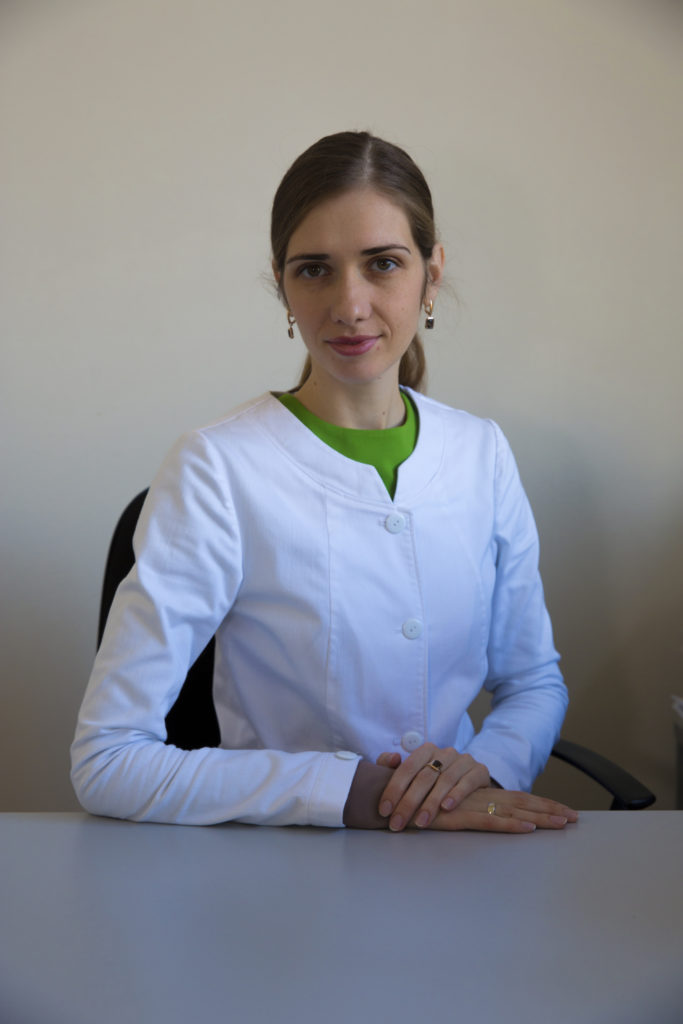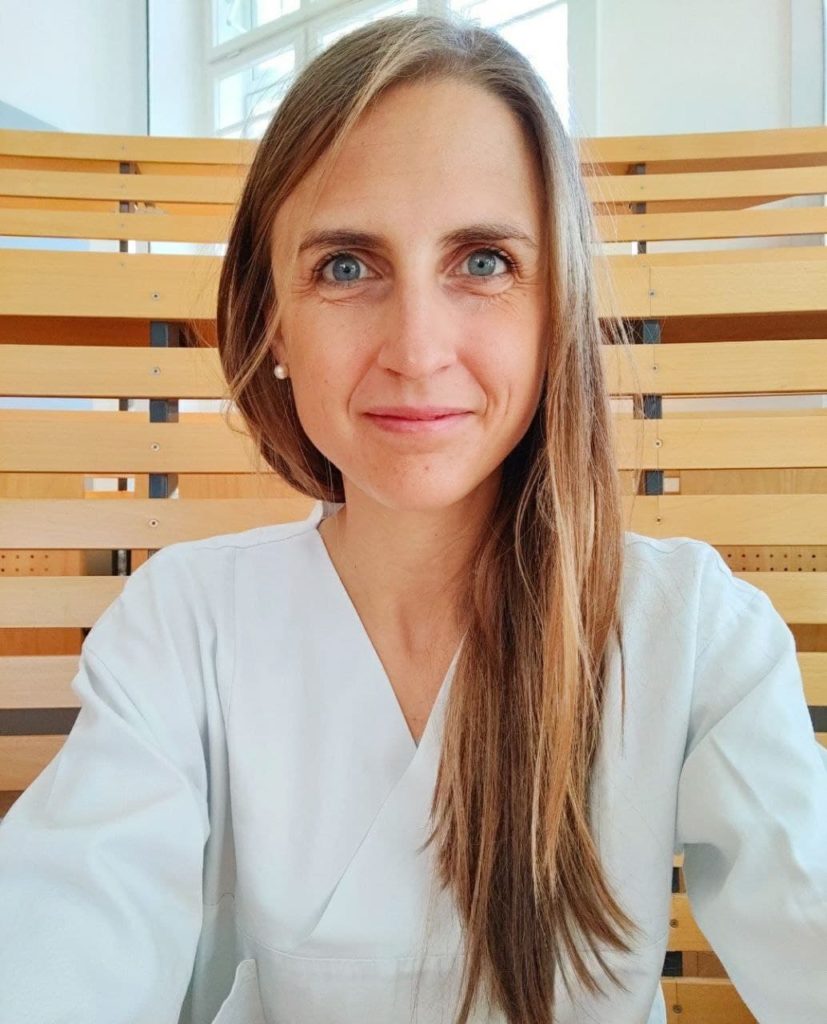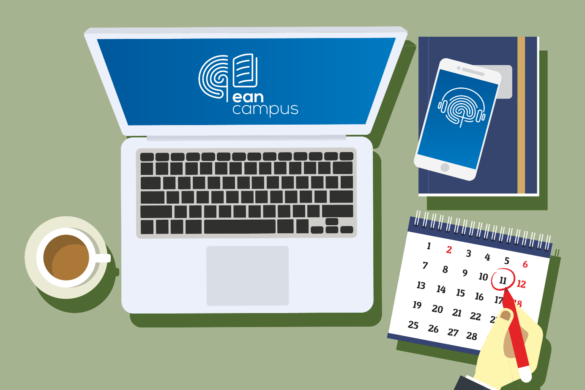
Mariia Gubanova, Moscow Oblast, Russia
Term of the Fellowship: 14.6. – 30.7.2021
Hosting department: Department of Neurology, Evangelical Hospital Unna, von-der-Mark Strasse 3, 59423 Unna, Germany
Supervisor: Prof. Dr. Med. Zaza Katsarava
My name is Maria Gubanova and I am a neurologist who was lucky enough to become one of the participants of the European Academy of Neurology’s Clinical Fellowship Programme. This summer I did an internship at the Evangelical Hospital Unna, Medical Faculty University of Duisburg-Essen, Germany.
It was an incredible opportunity for me to work under the direction of Prof. Dr. med. Zaza Katsarava, the current president of the European Headache Federation. He is an excellent researcher and a very competent clinician with extensive experience; a person who pays close attention to the well-being of others, such as members of his neurological team.
From the first day, I took part in all clinical activities of the department, including daily outpatient consultations for patients with headache and otherwise.
Since headache is in the sphere of my clinical and scientific interests, I was able to improve my skills in conducting differential diagnosis for different types of headaches, improved my understanding of the choice of preventive treatment, and learned how to choose the combination of drugs preferable in each individual case. I have learned the therapeutic management of more severe cases. I got to know more about monoclonal antibodies to сalcitonin gene-related peptide and its receptor which is a promising target for migraine prevention. The professor helped me to understand what scientific ideas I need to develop in order to benefit patients with primary headaches.
The internship lasted less than two months but was very well organised. The working day began with a round of patients that was done jointly with the professor and other senior doctors. During the rounds, a detailed analysis of patient complaints and anamnesis of the disease took place, and further work-up and treatment of each individual patient was planned. If the patient was diagnostically difficult, at the first meeting, I was taught to build a complex differential series of possible nosologies and develop a plan for conducting the necessary studies with a biopsy, for example, a nerve, a muscle, etc.
The Evangelical Hospital Unna has a large neurological service. In the departments of general neurology, I managed to see patients with completely different neurological diseases – vascular diseases, movement disorders, demyelinating diseases, diseases of the peripheral nervous system, myopathy, cognitive impairment, and dementia. I worked a few days in the stroke unit and the intensive care unit, which were very useful experiences for me: I practiced my skills in helping patients with acute stroke and other emergency situations (status epilepticus, etc.). In a large epilepsy department, I had the opportunity to examine patients with rare genetic epileptic syndromes. In addition, I learned a lot about the different treatment options (both medication and cognitive-behavioral interventions).
I also spent a few days working together with the Electrophysiology Study and Interpretation Team (evoked potentials of different modalities, electroneuromyography, needle electromyography, diagnostic transcranial magnetic stimulation).
The daily conferences together with the staff of the Department of Neuroradiology deserve a special mention. In the afternoon, all neurologists had the opportunity to view the results of MRI visualisation of their patients and discuss all questions of interest with specialists. This was very instructive and greatly expanded my understanding of MRI visualisation modes in the differential diagnosis of various diseases of the central nervous system.
Once again, I would like to express my deepest gratitude to the European Academy of Neurology for kindly giving me the opportunity to do a clinical internship, notwithstanding the ongoing COVID crisis. My special thanks to the entire Evangelical Hospital Unna team for sharing their knowledge and new ideas for research projects with me and for including me in their working activities.
I hope all the skills I have learned will help me to improve even more the care of patients in my own department.

Benedetta Storti, San Donà di Piave, Italy
Term of the Fellowship: 19.7.-4.6. – 30.7.2021
Hosting department: Department of Neurology, Medical University of Graz, Auenbruggerplatz 22, 8036 Graz, Austria
Supervisor: PD DDr. Thomas Gattringer
Die Menschen haben keine Ahnung, wie man schon denken kann; wenn man sie neu denken lehren könnte, würden sie auch anders leben. [Robert Musil]
I think this quote from Austrian author Robert Musil fits my experience in Austria perfectly.
I spent my summer in Graz, a very green and fancy town, where everyone rides bikes and the stores close at 6pm. A very different place from Milan, the city where I usually live and where I am attending my last year of residency in Neurology.
I applied for my EAN Clinical Fellowship two years ago and then, due to the Covid pandemic, my departure was postponed several times. By now, I admit, with my residency almost over, my hope of leaving was very low. But I was very lucky and, thanks to the favour of my Professor in Italy, Carlo Ferrarese, I was able to leave.
Finally, my Clinical Fellowship at the Medical University of Graz, with the favour of Professor Enzinger and the supervision of Professor Gattringer, began on July 19 and ended on August 27, 2021.
I spent six very intense weeks immersed in neurological practice, with a particular focus on vascular pathology and acute treatment of stroke patients. It was interesting and formative to learn how many aspects of clinical practice are solved differently in Austria, a country just across the border from Italy. In Italy the performance of brain MRI in the acute phase of the patient affected by a cerebrovascular event is still little used; we almost never intubate the patients before a thrombectomy; after the acute treatment the patient is almost always admitted in a semi-intensive ward, and not in a proper ICU; moreover, the focus on the intra and extra cerebral vascular ultrasonographic study and on the clinical reasoning that must be behind this examination, is something that I will take with me back to Italy. These are just a few examples that come to mind, but I could list many other strengths of the always punctual and efficient Austrian organisation. Among these is the smart management of a national database on stroke, which allows for the collection of data aimed not only at research, but also at perfecting the treatment of the patient.
I spent the six weeks of my internship here in six different departments, namely: Stroke Unit, ICU, Emergency Room, Neuroradiology, Interventional Radiology, and in the EMG outpatient clinic (the latter at my personal request, due to my interest in peripheral nervous system pathology and, not least, my desire to take advantage of the vast knowledge of a mentor like Professor Quasthoff). The program was organised to perfection and everyone I met demonstrated thorough knowledge as well as loving kindness.
The merit of this is certainly first of all of my tutor, Professor Thomas Gattringer, a neurologist with infinite clinical knowledge and contagious enthusiasm for research (just an example: Gattringer is on the committee for the ELAN -Early versus Late initiation of direct oral Anticoagulants in post-ischaemic stroke patients with atrial fibrillatioN- study). In addition, I was told he is also a good soccer player (although I have never seen him playing). I really hope to collaborate with him in the future.
Let me also thank all the staff, with a special mention to some doctors. Dr. Fandler, whose clinical eye sees beyond any radiological instrument. Dr. Eppinger, gifted with great humanity and the ability to solve any problem with optimism. Dr. Kneihsl, who has more to teach than to learn, and whose scepter is the ultrasound probe. Last but not least, Dr. Damulina, who has become a sincere friend and whom I look forward to hosting in Italy with great pleasure.
I return home full of enthusiasm and ideas and I hope to be able to share this with my Italian colleagues.
Thank you, EAN. It was a wonderful adventure!





